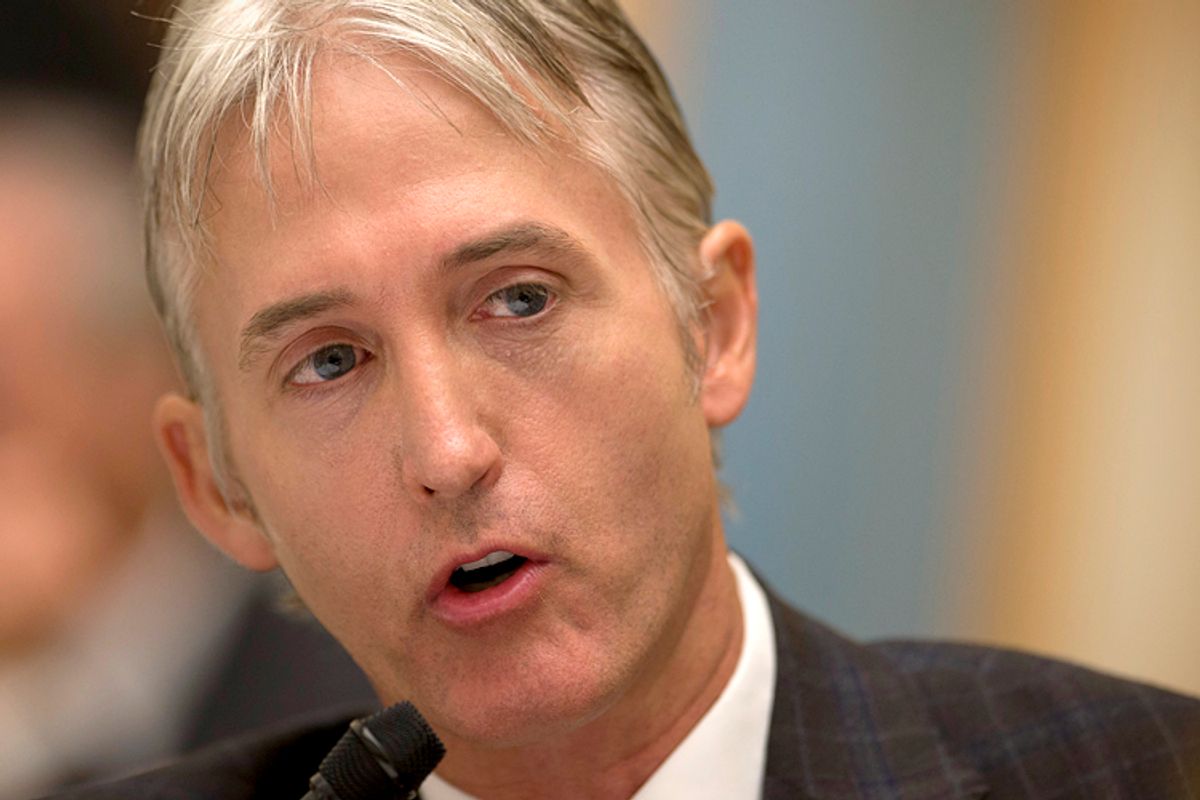In case you were at all concerned that the relative lack of Benghazi news of late meant that the issue was finally receding after nearly two years of intensive and fruitless investigation, fear not: in just a few short weeks, Benghazi-mania will live and breathe again. Rep. Trey Gowdy, chair of the House select committee tasked with beating whatever Benghazi bushes and dead horses remain, announced on July 30 that his committee’s first hearings will take place in September. If past is prologue, then Gowdy’s people will likely take advantage of the slow August news cycles and leak a few stripped-of-context tidbits to some bored and easily misled reporters. With the midterms bearing down, you’ll have all the necessary ingredients for yet more obsessive Benghazi “scandal” coverage.
It’s still not clear, though, what exactly anyone hopes to learn from Gowdy’s investigation, given that Benghazi has already been scrutinized several times over by several different congressional committees, all of which concluded that Benghazi was a tragedy, but there was no administration conspiracy, and no cover-up. And the day after Gowdy announced when his first hearings would be held, yet another committee reached the same conclusion.
On July 31, the House Permanent Select Committee on Intelligence voted in favor of releasing a declassified version of its findings from its investigation into Benghazi. Almost immediately, the top-ranking Democrats on the committee started broadcasting the report’s conclusions. Ranking member Rep. Dutch Ruppersberger released a statement saying:
The report also shows that the process used to develop the talking points was flawed, but that the talking points reflected the conflicting intelligence assessments in the days immediately following the crisis. Finally, the report demonstrates that there was no illegal activity or illegal arms sales occurring at U.S. facilities in Benghazi. And there was absolutely no evidence, in documents or testimony, that the Intelligence Community’s assessments were politically motivated in any way.
Adam Schiff, another top Democrat on the committee, issued a statement saying “the initial talking points provided by the intelligence community were flawed because of conflicting assessments not an intention to deceive, that there was no stand down order, that the diplomatic facilities lacked adequate security, and that our personnel at the scene acted bravely and appropriately.”
It’s entirely possible that the Democrats on the committee are putting the best spin that they can on the report and maybe they’re leaving something out, but the findings they’ve highlighted are consistent with what basically every other investigation has concluded. The House Armed Services Committee’s report also found that there was no intelligence pointing to an imminent threat in Benghazi, and there was no “stand down” order. The report was harsh on the White House’s and the State Department’s conduct in the lead-up to the attack, but stopped well short of anything conspiratorial.
All this leads one to ask, again, what exactly does Gowdy’s committee hope achieve? He’s already had his legs kicked out from underneath him multiple times as the “unanswered questions” he insists remain about Benghazi keep getting answered (often for the third or fourth time). Reports indicate that his September hearing will focus on the State Department’s Accountability Review Board report on the attacks, which was already investigated by the House Oversight Committee. Gowdy, a member of that committee, made a spectacle of himself for the cameras during the hearing and earned a lot of laudatory press from conservatives. That should give you a clue as to what these continued Benghazi investigations are really about.



Shares